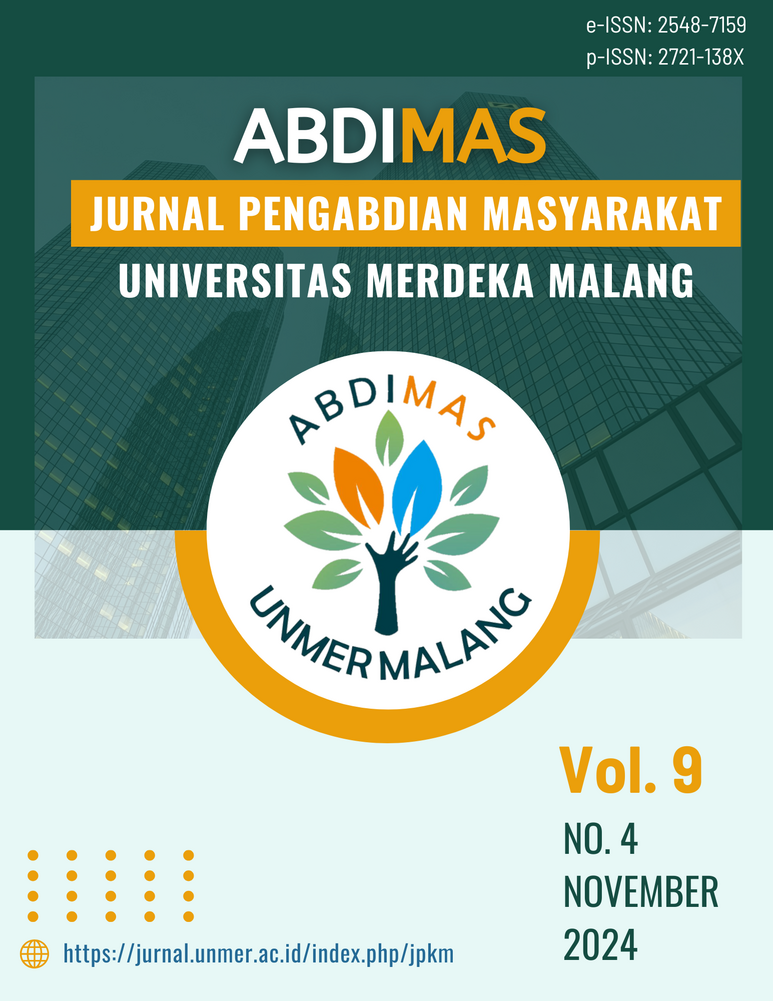Fermentation method for vegetable waste into liquid organic fertilizer in Malangsuko Village
DOI:
https://doi.org/10.26905/abdimas.v9i4.13875Keywords:
Liquid organic fertilizer, Vegetable, Waste, Cabbage, FermentationAbstract
Malangsuko Village is one of the villages that produces quite a lot of horticultural crops such as vegetables. However, with this potential, Malangsuko village faces challenges in the use of inorganic fertilizers and the lack of organic waste management, especially vegetable waste which can pollute the environment. Seeing the existing potential and as a solution to these problems, the need for organic fertilizer can be made by utilizing vegetable waste in Malangsuko village. This activity aims to process organic waste from vegetable waste into liquid organic fertilizer (POC). The method of implementing this community service is carried out by training and mentoring the processing of organic waste into liquid organic fertilizer using the fermentation method. The results of the training and mentoring were an increase in partner skills, namely PKK women in Malangsuko village, making POC by 55%. The potential for processing organic waste in the form of vegetable waste into POC that partners can produce is two sacks of vegetable waste per day (± 50 Kg), so the amount of POC that partners can produce is 250 L per day.
Downloads
References
Agustin, I. A., Pawestriningtyas, H. K., Lestari, L. W., Al Aziz, S., Rahmat, F., & Gafur, A. (2023). Penyuluhan pembuatan Pupuk Organik Cair (POC) dari limbah sayur di Dusun Jatisari, Desa Ngajum, Kabupaten Malang. JRCE (Journal of Research on Community Engagement), 4(2). https://doi.org/10.18860/jrce.v4i2.20024.
Amilia, W., Rusdianto, A. S., & Choiron, M. (2024). Empowerment of the Tirtobakti II Farmer Group to improve production capacity of frass organic fertilizer. Abdimas: Jurnal Pengabdian Masyarakat Universitas Merdeka Malang, 9(2), 338-349. https://doi.org/10.26905/abdimas.v9i2.12423
Arifin, M., & Aiyanto. (2018). Desa penghasil kopi untuk meningkatkan ekonomi masyarakat di Desa Damarwulan Kecamatan Keling Kabupaten Jepara. Abdimas: Jurnal Pengabdian Masyarakat Universitas Merdeka Malang 3(1). https://doi.org/10.26905/abdimas.v3i1.224.
Bahtiar, K., Fajarfika, R., & Nafi’ah, H. H. (2024). Implementation of hybrid tomatoes as an effort to increase tomato harvest production. Abdimas Jurnal Pengabdian Masyarakat Universitas Merdeka Malang, 9(3), 483–490. https://doi.org/10.26905/abdimas.v9i3.13650
Basri, H. (2021). Sosialisasi Pembuatan dan aplikasi pupuk organik cair (POC) di Desa Peresak Kecamatan Narmada. Jurnal Abdidas, 2(6), 1437–1442. https://doi.org/10.31004/abdidas.v2i6.504.
Ermawati, D., Meicahayanti, I., Winalno, A., Sukamono, Y., Pinasthika, D., Septilani, I., & Baiduri, I. (2024). Assistance for Pokdarwis Zwageri Borneo in providing clean water needs fur rural tourism areas. Pengabdian Masyarakat Universitas Negeri Malang, 9(2), 316–328.
https://jurnal.unmer.ac.id/index.php/jpkm/article/view/12210/pdf.
Fauzan, S., Nugroho, P., Agustina, S., & Moliani, A. I. (2023). Peningkatan ekonomi desa melalui pemberdayaan masyarakat dalam pengolahan limbah menjadi pupuk organik. Prima Abdika Jurnal Pengabdian Masyarakat, 3(4), 483–491. https://doi.org/10.37478/abdika.v3i4.3217
Haryuni, K., Ratih. D., Budiyono, A., Utami, D. S., & Prasetyowati, K. (2021). Pendampingan pembuatan Pupuk Organik Cair plus (POC plus). Ganesha: Jurnal Pengabdian Masyarakat, 1(02), 56–61. https://doi.org/10.36728/ganesha.v1i02.1456.
Krisnaningsih, A. T. N., & Setiyaningsih, W. (2018). IbM Kelompok Peternak Sapi Perah di Desa Kemiri Kecamatan Jabung Kabupaten Malang. Jurnal Pengabdian Masyarakat Universitas Merdeka Malang, 3(1). https://doi.org/10.26905/abdimas.v3i1.2249.
Paksi, A. K., Tiara, A., & Setyorini, F. A. (2022). Pendampingan pembuatan pupuk organik untuk meningkatkan produksi pertanian di Padukuhan Seropan II, Kelurahan Muntuk, Kepanewon Dlingo, Bantul. E-Dimas: Jurnal Pengabdian Kepada Masyarakat, 13(4), 699–706. https://doi.org/10.26877/e-dimas.v13i4.11996.
Pradiksa, I., Ari, W., & Widianingsih. (2022). Pengaruh bioaktivator EM4 terhadap proses degradasi Pupuk Organik Cair Cymodocea serrulata. Journal of Marine Research, 11(2), 136–144. https://doi.org/10.14710/jmr.v11i2.33771.
Prasetyo, D., & Evizal, R. (2021). Pembuatan dan upaya peningkatan kualitas pupuk organik cair. JURNAL AGROTROPIKA, 20(2), 68-80. https://doi.org/10.23960/ja.v20i2.5054
Purnamasari, I., Suci Ristiyana, Yagus Wijayanto, & Tri Wahyu Saputra. (2022). Pengolahan limbah kotoran sapi menjadi pupuk organik untuk perbaikan kualitas lingkungan Desa Seputih Kecamatan Mayang Kabupaten Jember. Jurnal Pengabdian Magister Pendidikan IPA, 5(1), 161–168. https://doi.org/10.29303/jpmpi.v5i1.1357.
Rasmito, A. (2019). Pembuatan pupuk organik cair dengan cara fermentasi limbah cair tahu, starter filtrat kulit pisang dan kubis, dan bioaktivator EM4. Iptek, 23(1), 55–62. http://dx.doi.org/10.31284/j.iptek.2019.v23i1.496.
Ramdhany, M. R. (2018). Analisis komoditas unggulan sub sektor pertanian terpilih berdasarkan volume produksi di Kabupaten Malang. Jurnal Ilmiah Mahasiswa FEB, 6(1). https://jimfeb.ub.ac.id/index.php/jimfeb/article/download/4608/4043
Siregar, F. A. (2023). Penggunaan pupuk organik dalam meningkatkan kualitas tanah dan produktivitas tanaman. https://doi.org/10.31219/osf.io/fyz8v
Solihin, E., Yuniarti, A., Damayani, M., & Rosniawaty, S. (2019). Application of liquid organic fertilizer and N, P, K to the properties of soil chemicals and growth of rice plant. IOP Conference Series: Earth and Environmental Science, 393(1), 012026. https://doi.org/10.1088/1755-1315/393/1/012026
Sulistyaningsih. (2020). Pemanfaatan limbah sayur, buah, dan kotoran hewan menjadi pupuk organik cair di Kelompok Tani Rukun Makaryo, Mojogedang, Karanganyar. Jurnal Surya Masyarakat, 3(1), 22-32 http://dx.doi.org/10.1088/1755-1315/393/1/012026.
Ustiatik, R., Pertiwi, B. L. S., Ariska, A. P., Wicaksono, K. S., Riza, S., Hadi, S. R. I., Riyanto, A., Arisoesilaningsih, E., & Utami, S. R. (2024). Strengthen farmers’ fertilizer self-sufficiency in the tourist area with a reduce-reuse-recycle system. Abdimas Jurnal Pengabdian Masyarakat Universitas Merdeka Malang, 9(3), 543–554. https://doi.org/10.26905/abdimas.v9i3.13059
Wardhani, R. K. (2021). Kecamatan Tumpang dalam angka 2021. CV. Kurnia https://malangkab.bps.go.id/publication/2021/09/24/78976f69160307b1817f3e15/kecamatan-tumpang-dalam-angka-2021.html.
Downloads
Published
How to Cite
Issue
Section
License
Copyright (c) 2024 Abdimas: Jurnal Pengabdian Masyarakat Universitas Merdeka Malang

This work is licensed under a Creative Commons Attribution-ShareAlike 4.0 International License.
Authors who publish with this journal agree to the following terms:
- Copyright of the published articles will be transferred to the journal as the publisher of the manuscripts. Therefore, the author confirms that the copyright has been managed by the journal.
- Publisher of Abdimas: Jurnal Pengabdian Masyarakat Universitas Merdeka Malang is University of Merdeka Malang.
- The copyright follows Creative Commons Attribution-ShareAlike License (CC BY SA): This license allows to share, copy, and redistribute the material in any medium or format, adapt, remix, transform, and build upon the material, for any purpose, even commercially.





